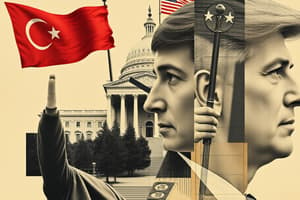Podcast
Questions and Answers
What major principle did the Magna Carta establish?
What major principle did the Magna Carta establish?
- Government should operate without any legal constraints.
- Limited government is necessary to protect individual rights. (correct)
- Absolute monarchy is essential for stability.
- The monarch must have total control over legislative processes.
Which of the following was a key limitation imposed by the English Bill of Rights?
Which of the following was a key limitation imposed by the English Bill of Rights?
- The ability to levy taxes without a parliamentary vote.
- The monarch's authority to suspend laws at will. (correct)
- The monarch's right to interfere with parliamentary proceedings. (correct)
- The right of the monarch to maintain a standing army in peacetime. (correct)
What philosophical ideas did John Locke promote regarding government?
What philosophical ideas did John Locke promote regarding government?
- People have natural rights that must be protected by government. (correct)
- The government should avoid any contracts with the citizens.
- People must adhere to an unlimited authoritative government.
- Government is a tool for enforcing divine rights.
What role did the Petition of Right play in shaping limited government?
What role did the Petition of Right play in shaping limited government?
Which historical event is referred to as the Glorious Revolution?
Which historical event is referred to as the Glorious Revolution?
Which trait was common among the English colonies in America?
Which trait was common among the English colonies in America?
The Mayflower Compact is significant because it was the first:
The Mayflower Compact is significant because it was the first:
What is a characteristic of representative government as practiced in the English colonies?
What is a characteristic of representative government as practiced in the English colonies?
What was the significance of the Great Fundamentals enacted in 1636?
What was the significance of the Great Fundamentals enacted in 1636?
Which document outlined a plan for the election of governors and judges in the Connecticut colony?
Which document outlined a plan for the election of governors and judges in the Connecticut colony?
Which statement accurately describes the role of colonial legislatures?
Which statement accurately describes the role of colonial legislatures?
What was the purpose of the separation of powers in colonial governance?
What was the purpose of the separation of powers in colonial governance?
How did colonial legislatures contribute to the future development of the Constitution?
How did colonial legislatures contribute to the future development of the Constitution?
Study Notes
Limited Government
- Magna Carta (1215): Established principles of limited government, curbing monarch's absolute power; protected rights to life, liberty, and property.
- Monarchs required consent from Parliament to:
- Levy taxes
- Imprison individuals (just cause only)
- Force housing of troops
- Impose martial law during peacetime
- Petition of Right (1628): Further limited the power of the monarchy.
English Bill of Rights (1688)
- Aimed to define limits of monarchical power after the Glorious Revolution.
- Required monarchs to seek consent from Parliament to:
- Suspend laws
- Levy taxes
- Maintain an army
- Provided rights for the populace such as:
- Right to a fair and speedy trial
- Protection against cruel and unusual punishment
- Marked the end of the divine right of kings.
Representative Government
- Concept that citizens elect delegates to create laws and govern the state.
- American legislative practices evolved from English representation models.
- John Locke (1632-1704): Influential philosopher who championed natural rights (life, liberty, property) and government accountability:
- Advocated for a social contract: if the government fails, citizens have the right to alter it.
- Stressed that government authority derives from the consent of the governed.
Government in the Colonies
- Colonies exhibited common traits in self-governance:
- Each had elected legislatures.
- Limited powers for executives.
- Most adopted written constitutions.
Written Constitutions
- Mayflower Compact (1620): The first self-governing document in the colonies, establishing leaders and laws chosen by the Pilgrims.
- Fundamental Orders of Connecticut (1639): Outline for electing officials and law-making representatives.
Colonial Legislatures
- Virginia House of Burgesses (1619): First legislative assembly in America, showcasing early representation.
- Colonial legislatures became pivotal to governance, creating laws to adapt to changing conditions.
Separation of Powers
- Government powers divided among:
- Executive branch led by the king's agent
- Legislative branch held by colonial legislatures
- Judicial branch managed through colonial courts
- Colonial legislatures served as training grounds for future leaders who would draft the U.S. Constitution.
Studying That Suits You
Use AI to generate personalized quizzes and flashcards to suit your learning preferences.
Description
Explore the foundations of limited government in English history, focusing on key documents such as the Magna Carta and the Petition of Right. This quiz delves into how these historical texts shaped the rights and liberties of individuals against the power of monarchs.




